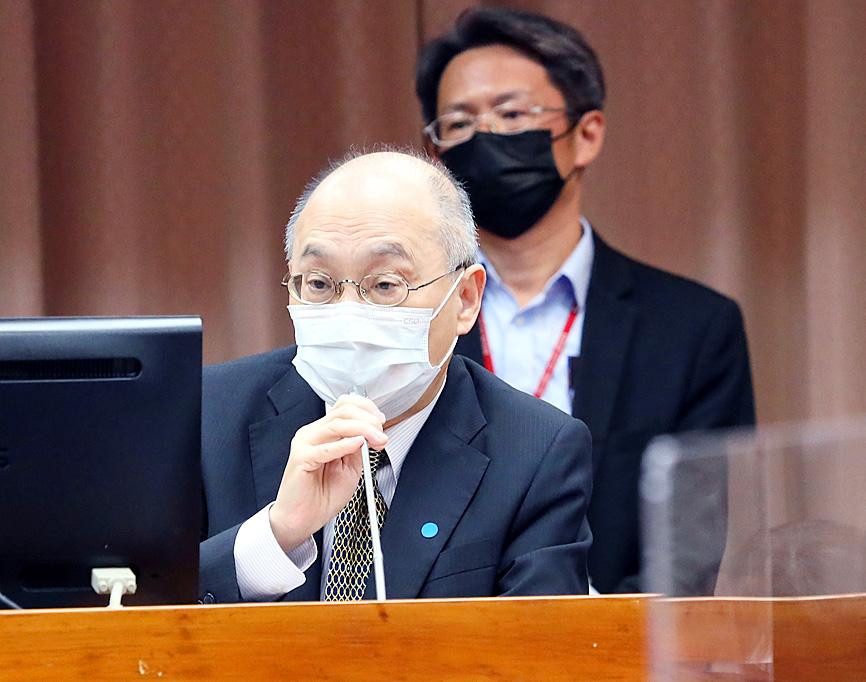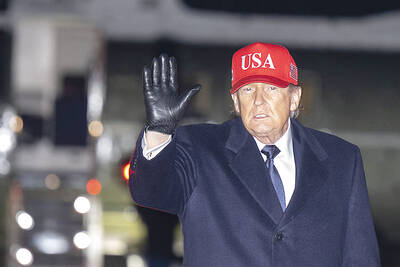National Palace Museum director Wu Mi-cha (吳密察) yesterday said that he does not know an ideal location to store historical artifacts on the museum’s collection if a war broke out in Taiwan, but pledged to stipulate an evacuation plan within three months and hold a drill in July.
Wu attended a meeting at the Legislature’s Education and Culture Committee to brief lawmakers about the museum’s operations.
However, many lawmakers were concerned whether the museum has the personnel and protocols in place to move nearly 700,000 historical artifacts to a safe location in the event of a war, after seeing museum staff in Ukraine struggle to salvage historical objects following the Russian invasion.

Photo: CNA
Democratic Progressive Party Legislator Huang Kuo-shu (黃國書) and Chinese Nationalist Party (KMT) Legislator Wan Mei-ling (萬美玲) asked whether the museum has selected locations to store historical artifacts, considering that staff at the Andrey Sheptytsky National Museum of Lviv, Ukraine, are having problems finding a place to store nearly 12,000 historical objects that they removed from the museum.
Wan said that the National Palace Museum needs to be prepared to evacuate historical objects in an emergency situation, adding that it would be too late if the museum waits until then to react.
Wu said the rules governing a disaster and emergency response plan at the National Palace Museum mainly prepare the staff to respond to a flood, fire or an earthquake.
While the museum has been holding drills for various emergency situations, it has yet to hold drills for a war or airstrike, he said.
“The National Palace Museum has more than 690,000 historical objects. If we were to hold a drill for a scenario of a war or an air raid, we would need to first divide the objects into different categories, simulate the packaging of these objects and safely move them to designated locations. This is no small matter,” he added.
“Evacuating historical objects is much more complicated than evacuating people, and frankly I cannot think of any place to store them at the moment. National security officials might know some very safe locations, but we do not know whether those locations can safely preserve historical objects as we do at the National Palace Museum,” Wu said.
Wu pledged to spend the next three months establishing a wartime response task force and consulting national security officials about possible storage locations for historical artifacts.

Taiwan has received more than US$70 million in royalties as of the end of last year from developing the F-16V jet as countries worldwide purchase or upgrade to this popular model, government and military officials said on Saturday. Taiwan funded the development of the F-16V jet and ended up the sole investor as other countries withdrew from the program. Now the F-16V is increasingly popular and countries must pay Taiwan a percentage in royalties when they purchase new F-16V aircraft or upgrade older F-16 models. The next five years are expected to be the peak for these royalties, with Taiwan potentially earning

STAY IN YOUR LANE: As the US and Israel attack Iran, the ministry has warned China not to overstep by including Taiwanese citizens in its evacuation orders The Ministry of Foreign Affairs (MOFA) yesterday rebuked a statement by China’s embassy in Israel that it would evacuate Taiwanese holders of Chinese travel documents from Israel amid the latter’s escalating conflict with Iran. Tensions have risen across the Middle East in the wake of US and Israeli airstrikes on Iran beginning Saturday. China subsequently issued an evacuation notice for its citizens. In a news release, the Chinese embassy in Israel said holders of “Taiwan compatriot permits (台胞證)” issued to Taiwanese nationals by Chinese authorities for travel to China — could register for evacuation to Egypt. In Taipei, the ministry yesterday said Taiwan

‘LIKE-MINDED PARTNER’: Tako van Popta said it would be inappropriate to delay signing the deal with Taiwan because of China, adding he would promote the issue Canadian senators have stressed Taiwan’s importance for international trade and expressed enthusiasm for ensuring the Taiwan-Canada trade cooperation framework agreement is implemented this year. Representative to Canada Harry Tseng (曾厚仁) in an interview with the Central News Agency (CNA) said he was increasingly uneasy about Ottawa’s delays in signing the agreement, especially as Ottawa has warmed toward Beijing. There are “no negotiations left. Not only [is it] initialed, we have three versions of the text ready: English, French and Mandarin,” Tseng said. “That tells you how close we are to the final signature.” Tseng said that he hoped Canadian Prime Minister Mark Carney

The US’ joint strikes with Israel on Iran dismantled a key pillar of China’s regional strategy, removing an important piece in Beijing’s potential Taiwan Strait scenario, said Zineb Riboua, a senior researcher at the Hudson Institute’s Center for Middle East Peace and Security. In an article titled: “The Iran Question Is All About China,” Riboua said that understanding the Iran issue in the context of China’s “grand strategy” is essential to fully grasp the complexity of the situation. Beijing has spent billions of dollars over the years turning Iran into a “structural strategic asset,” diverting US military resources in the